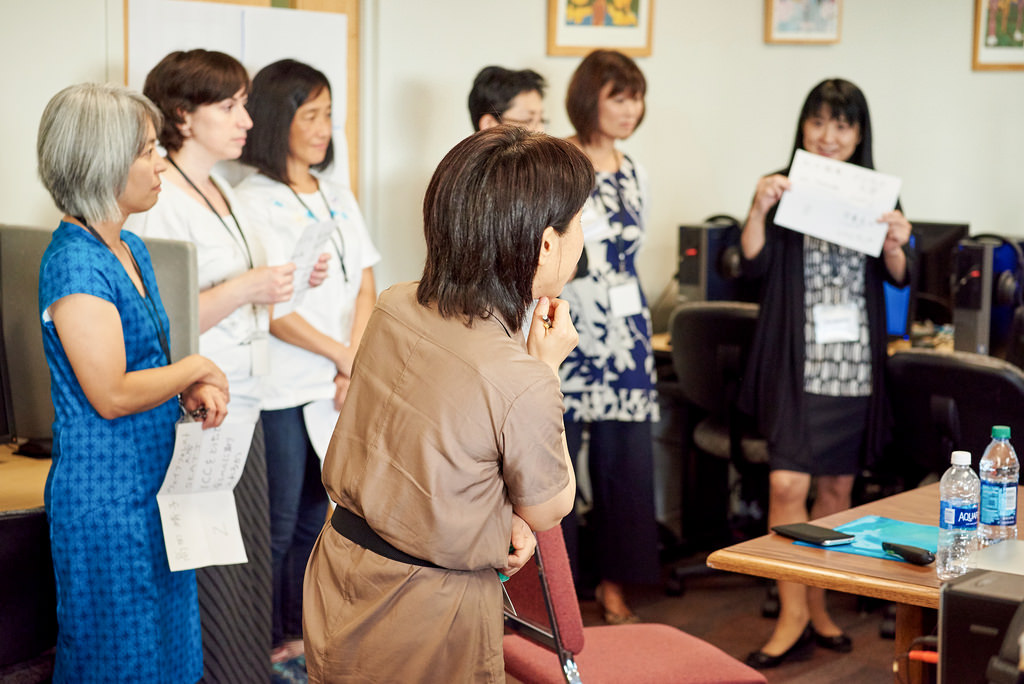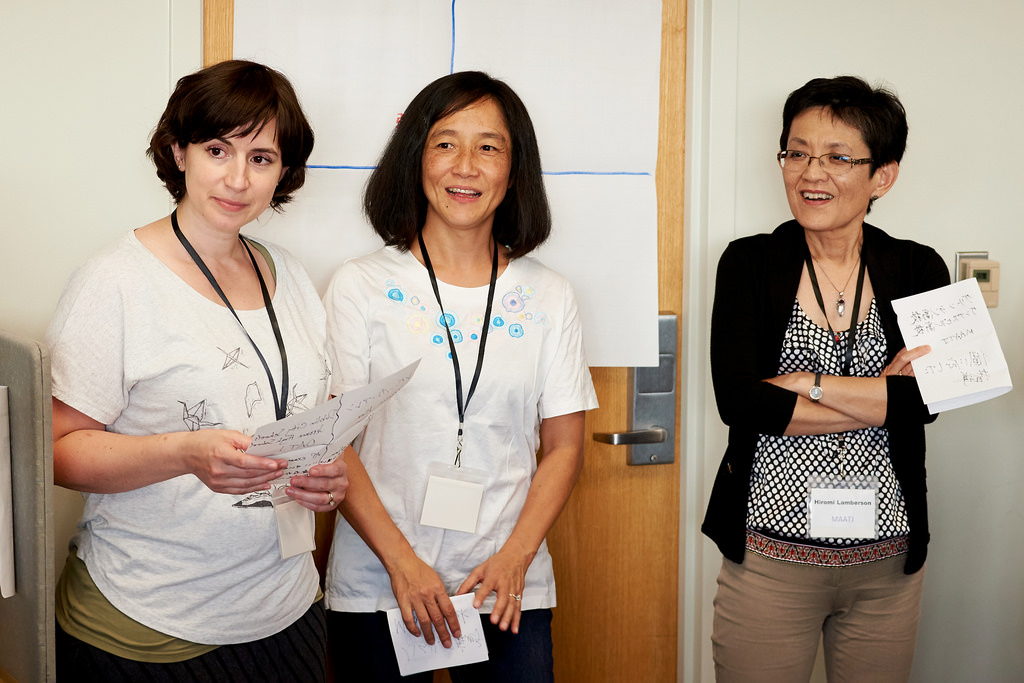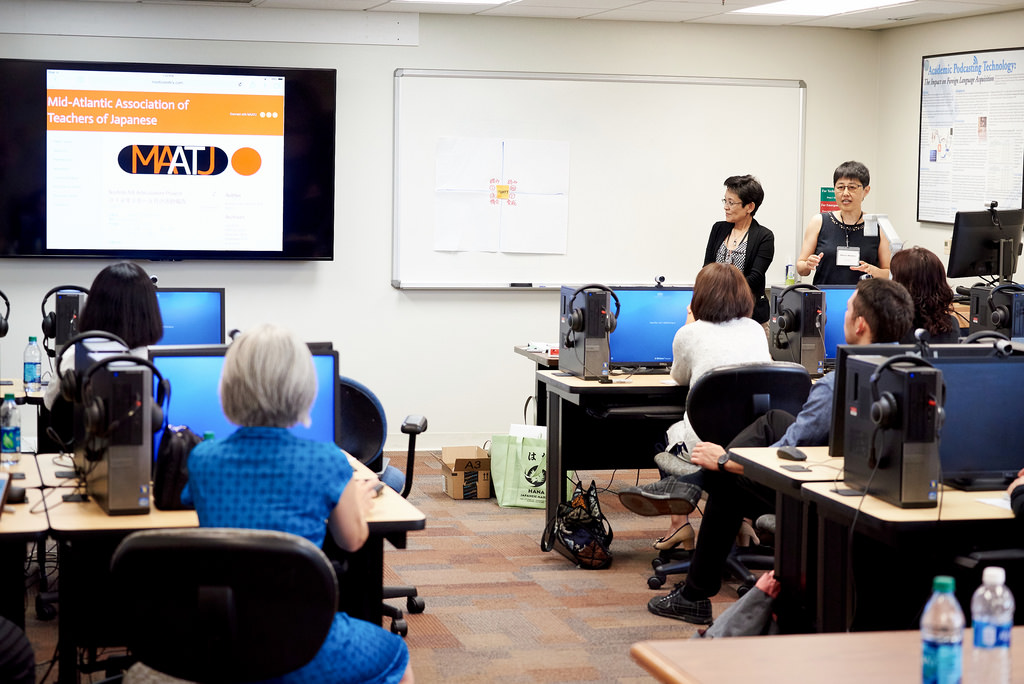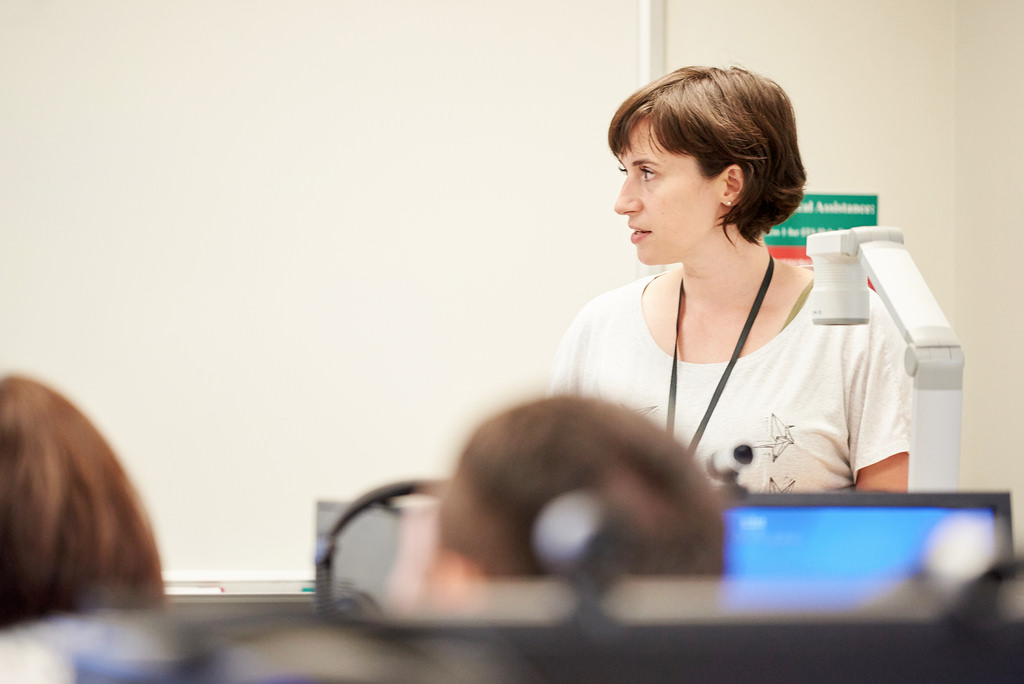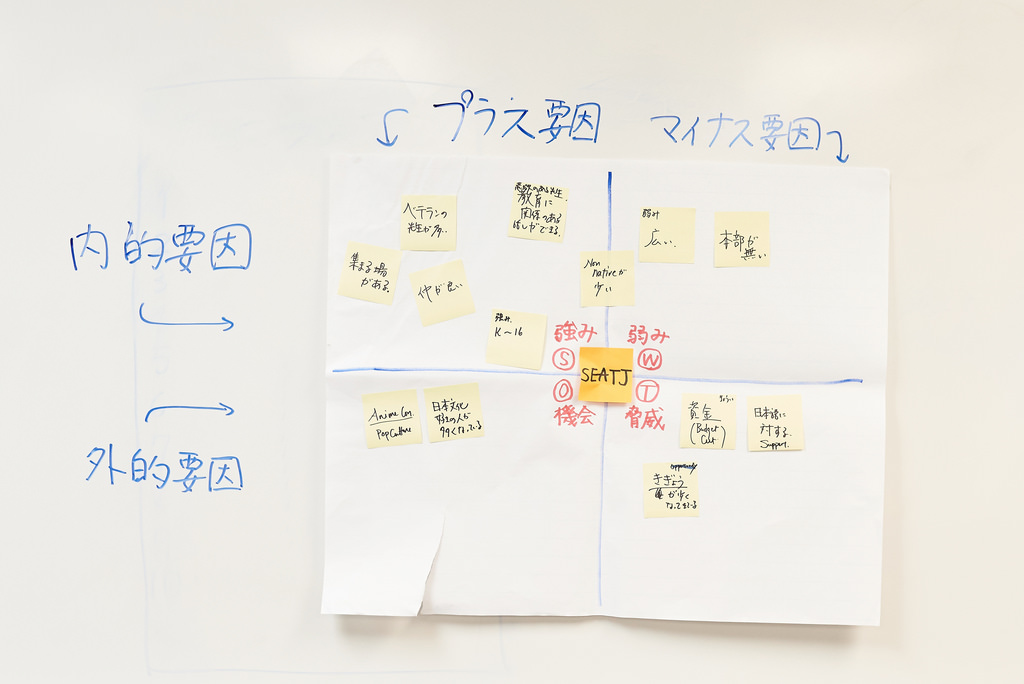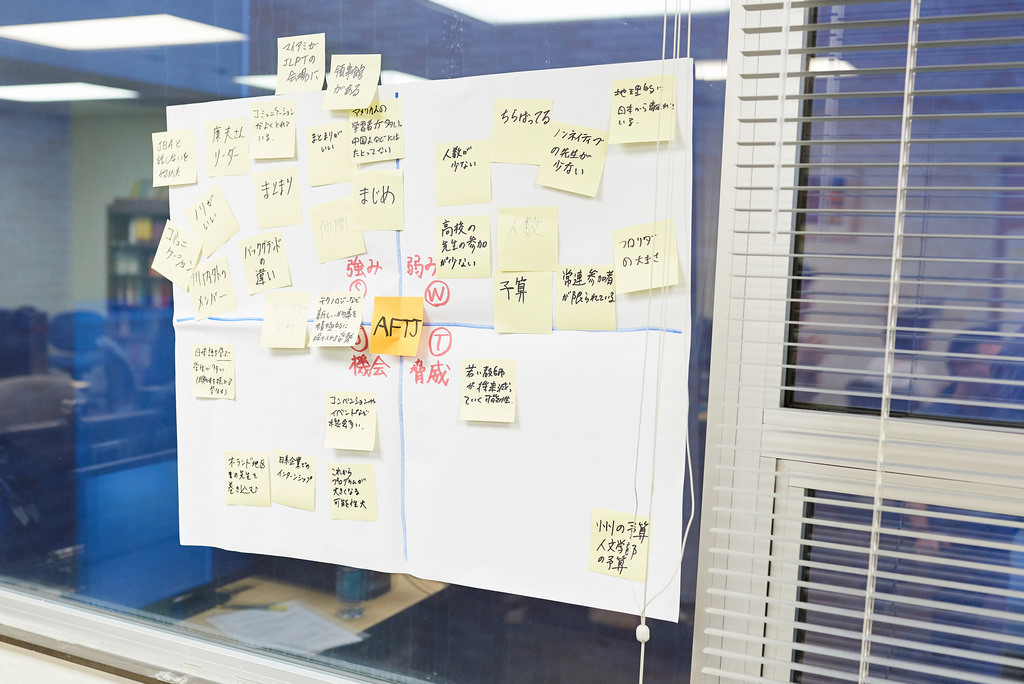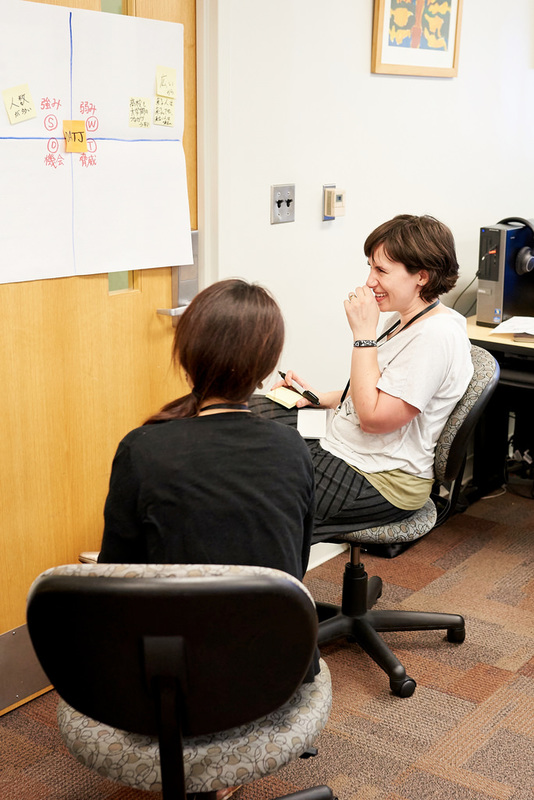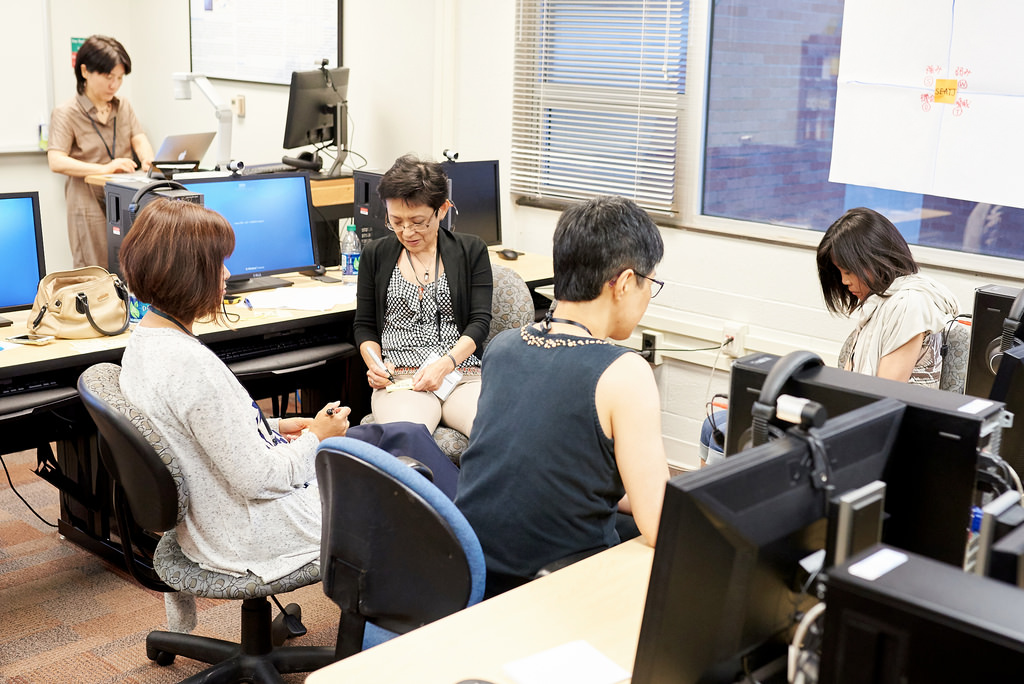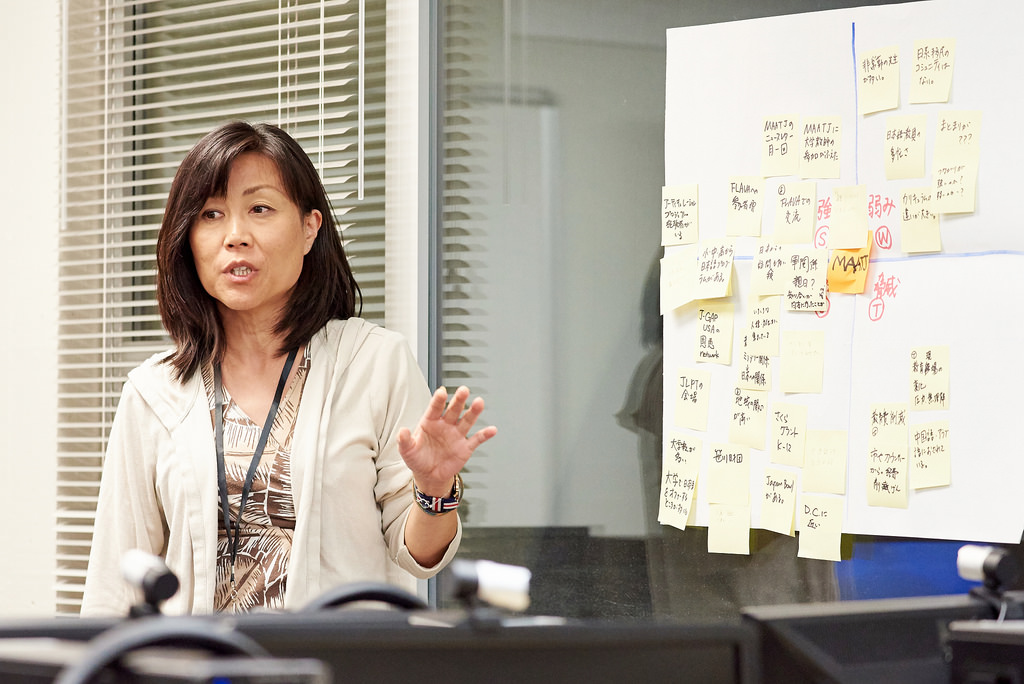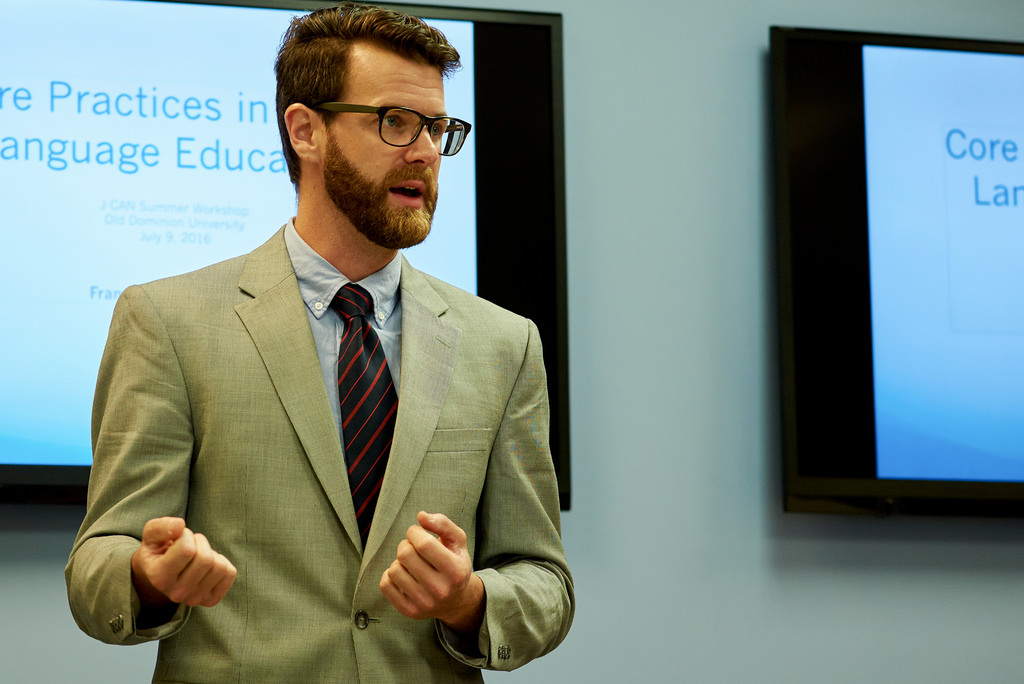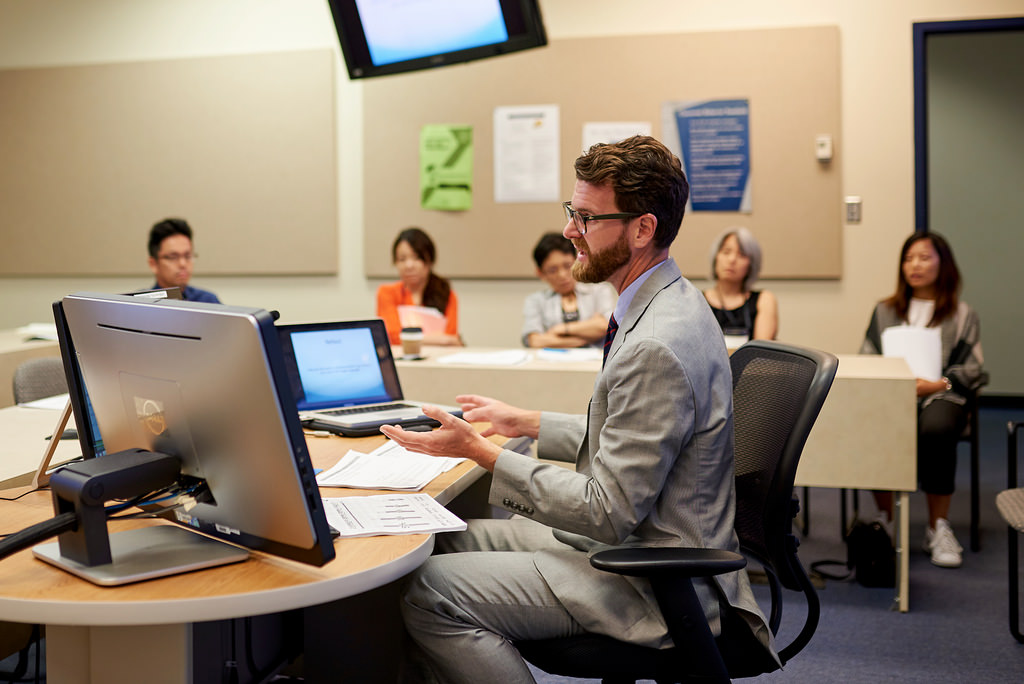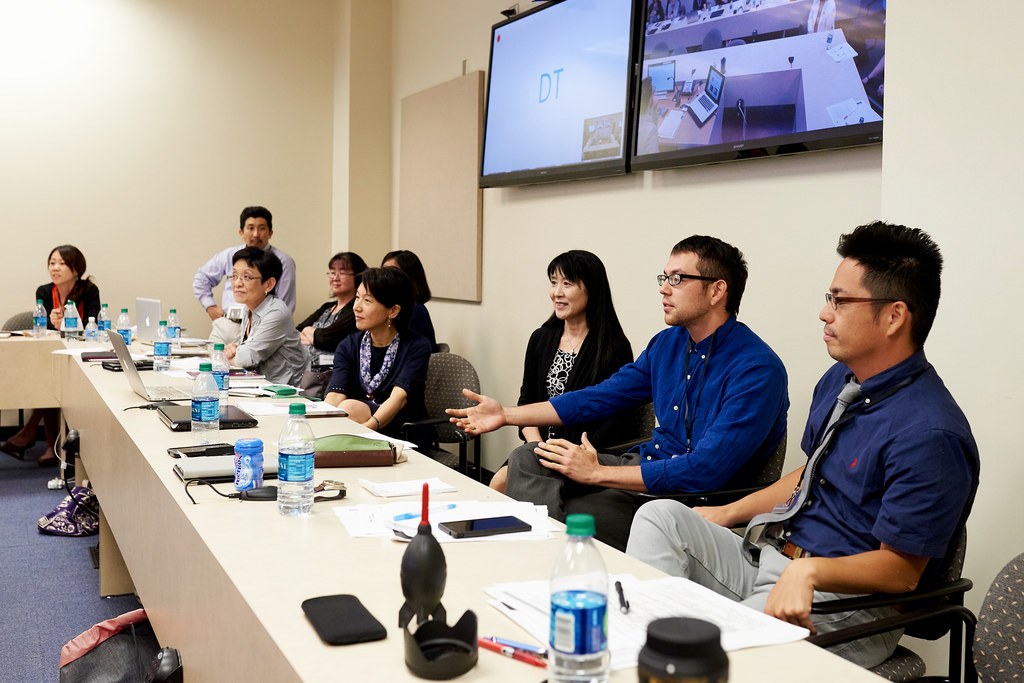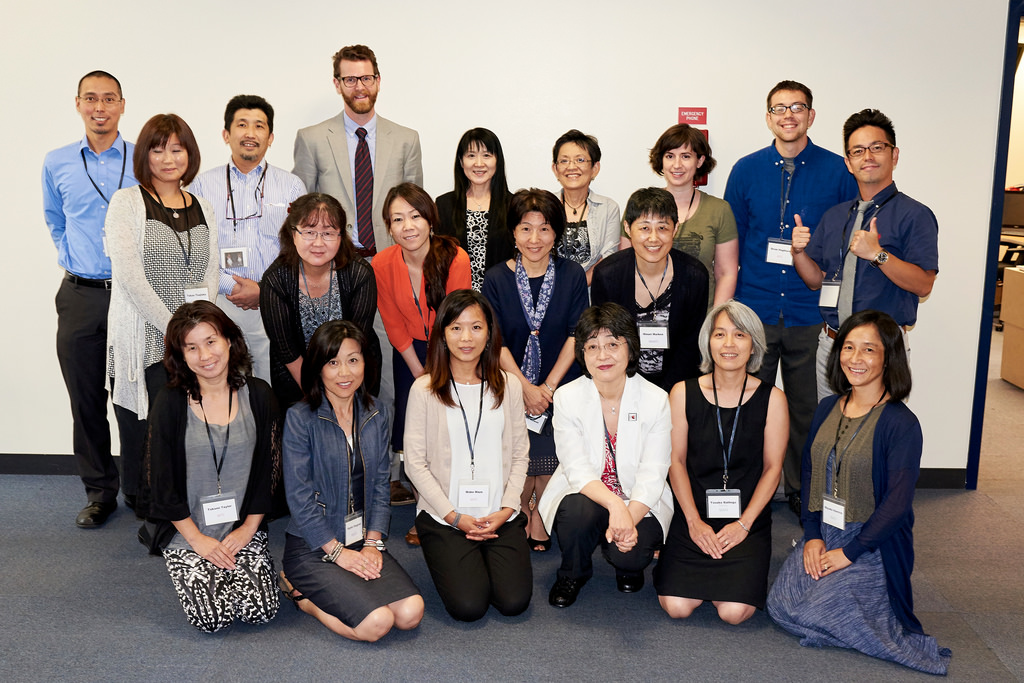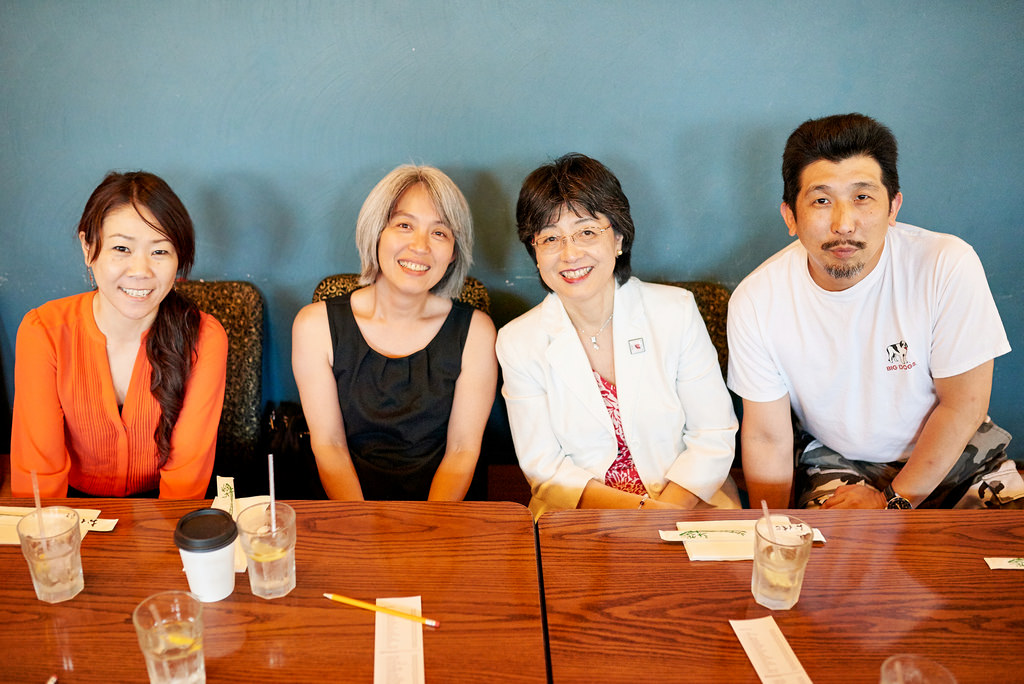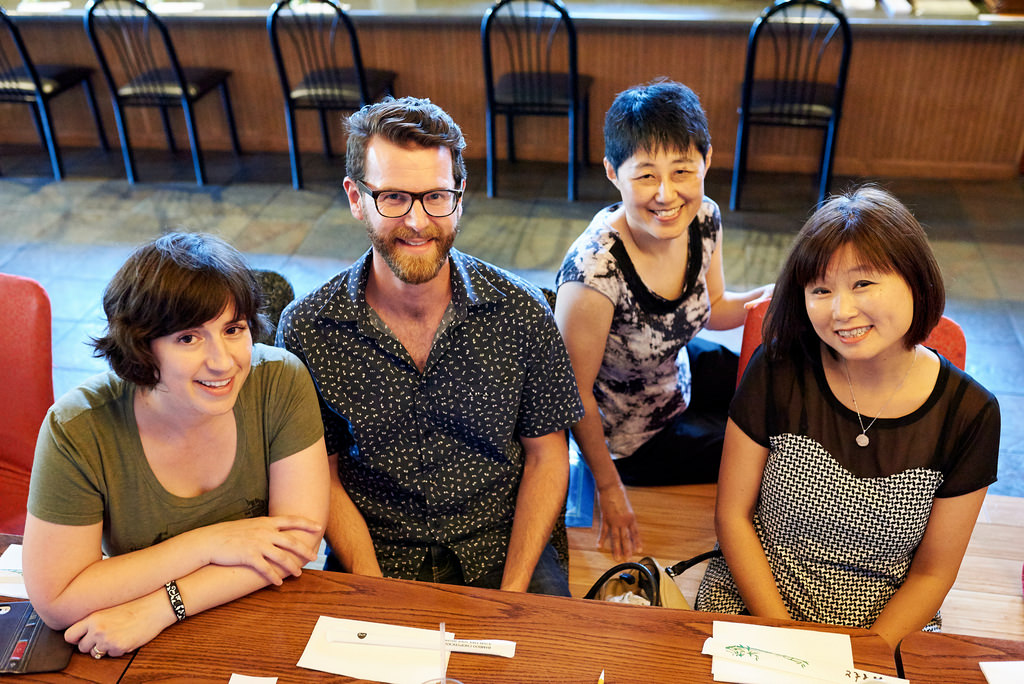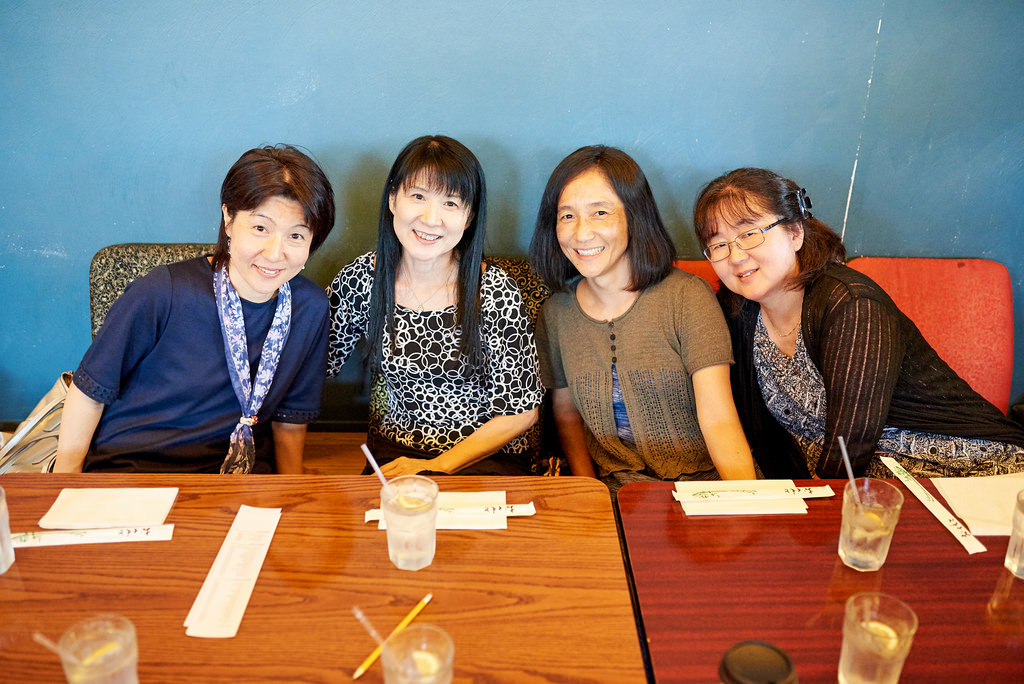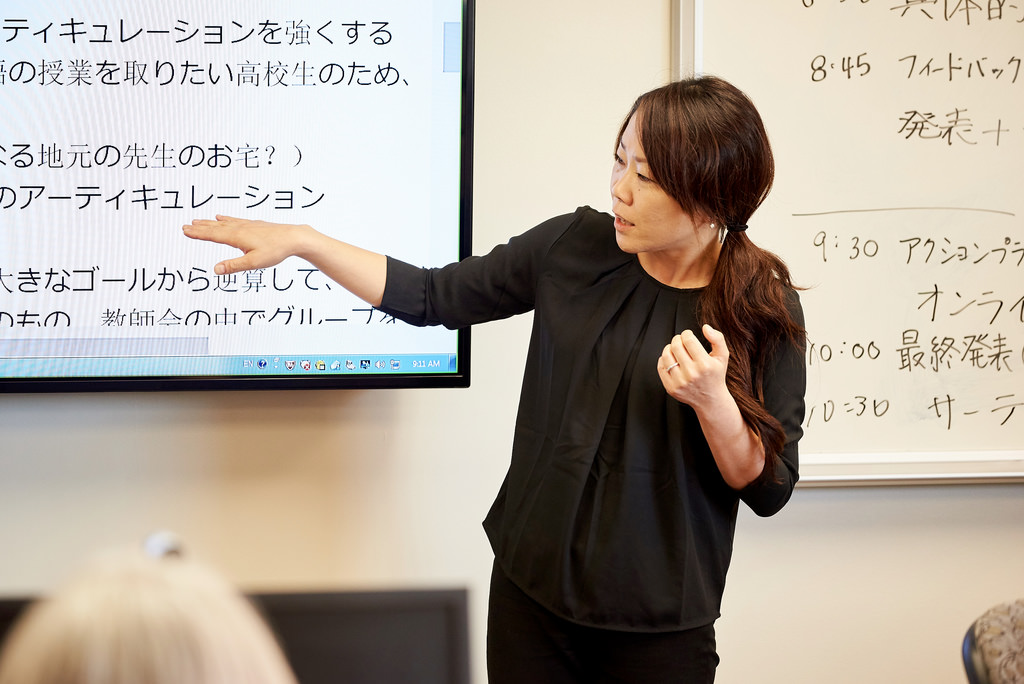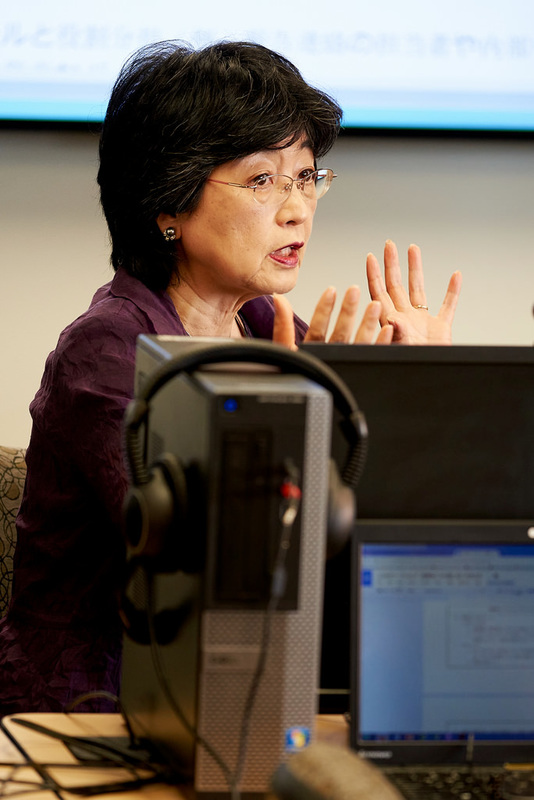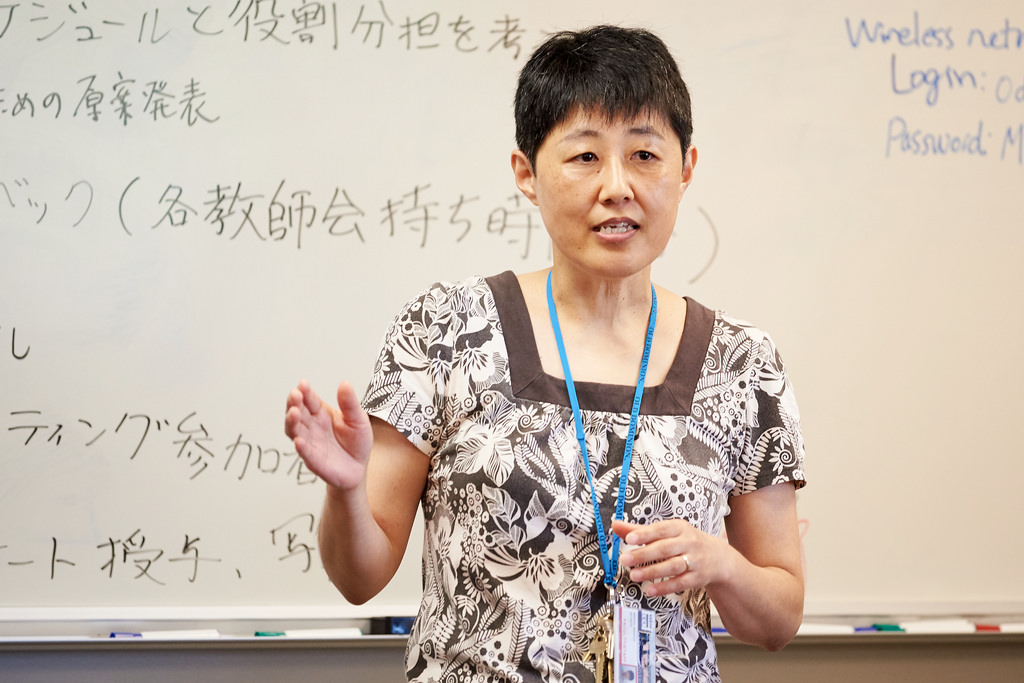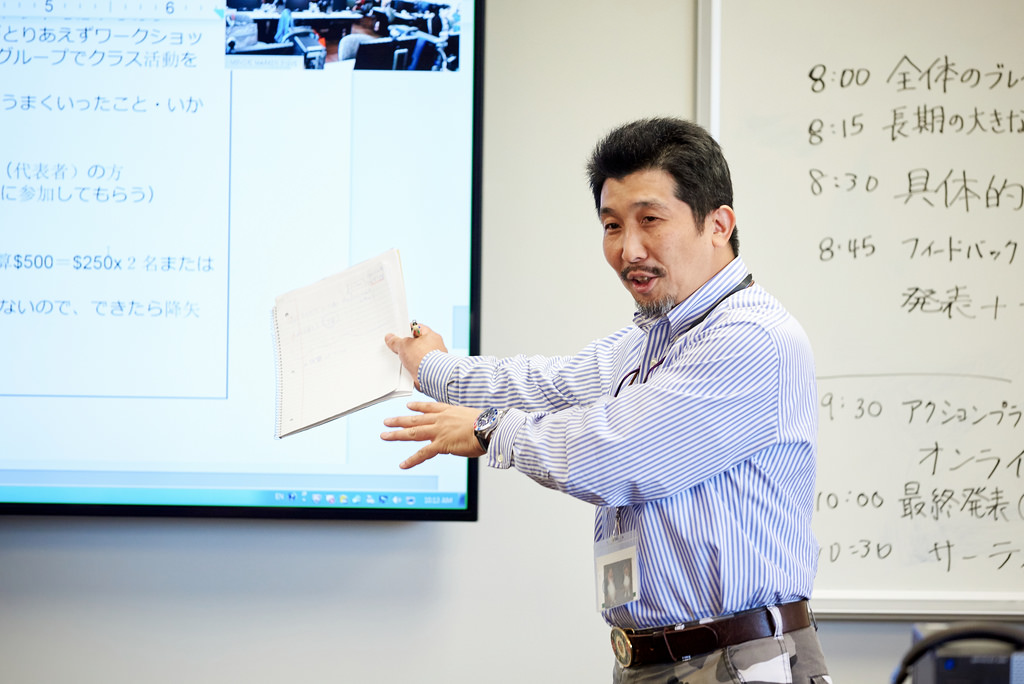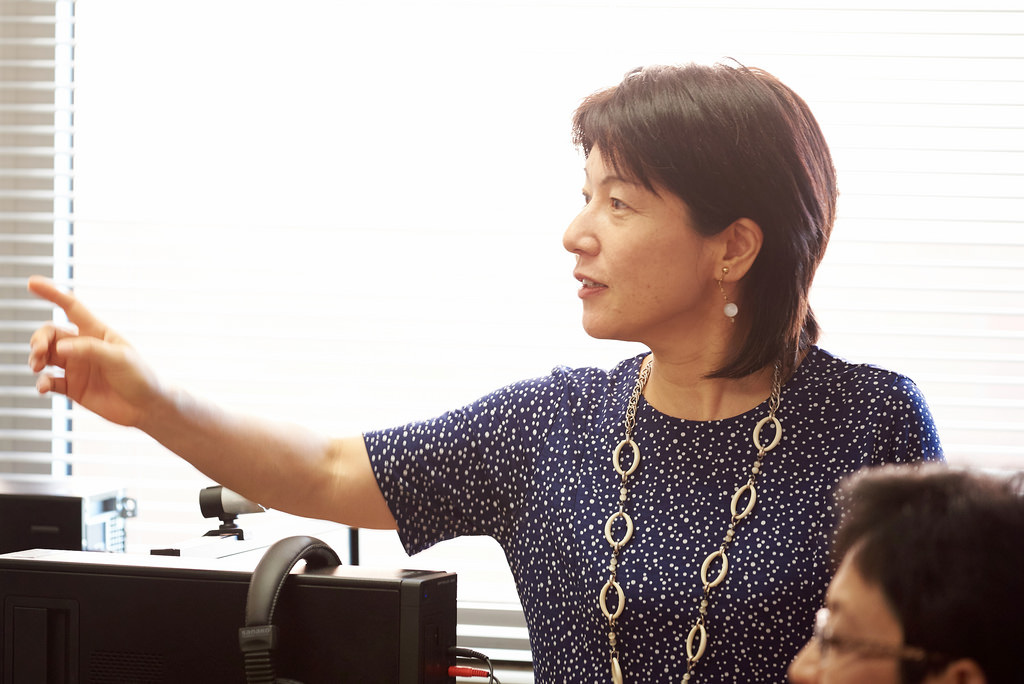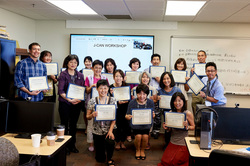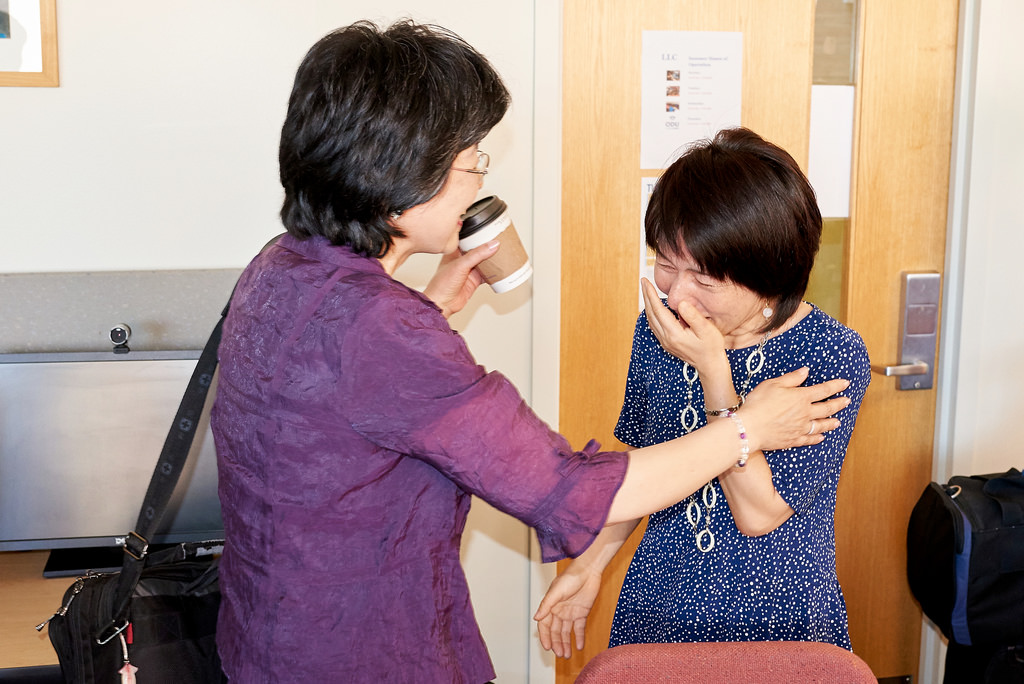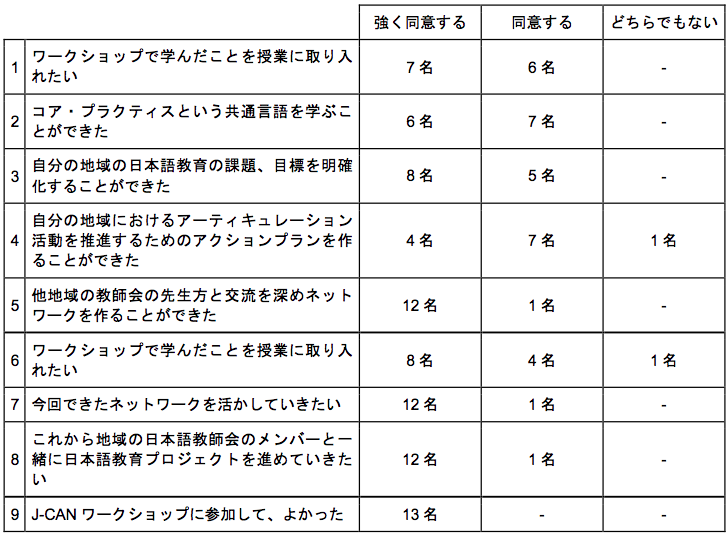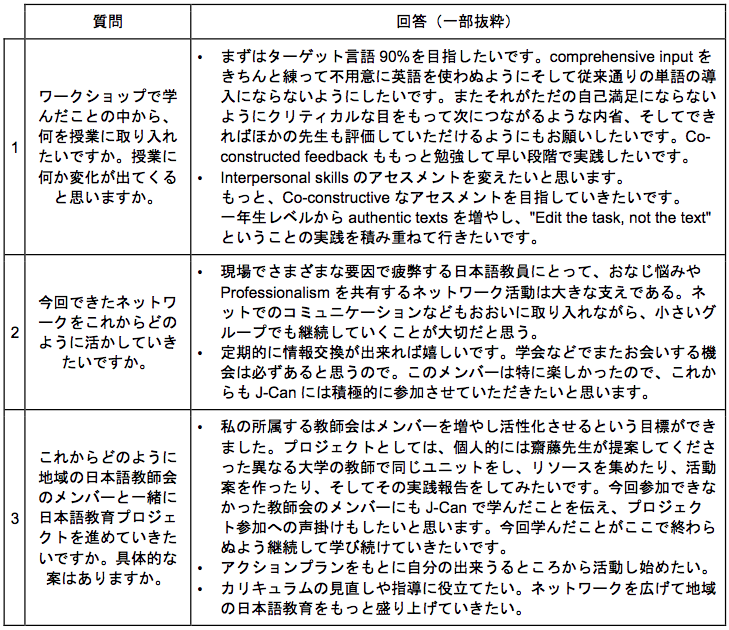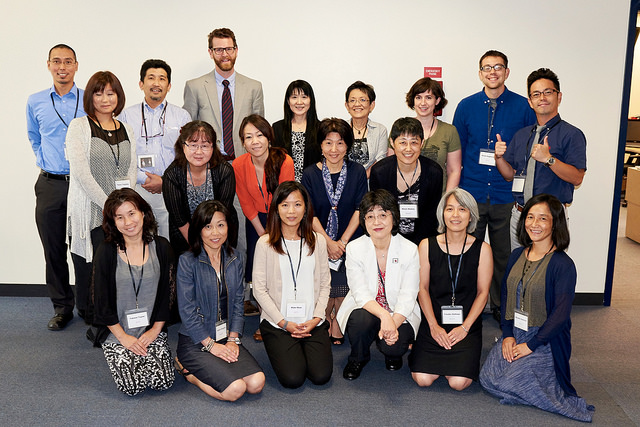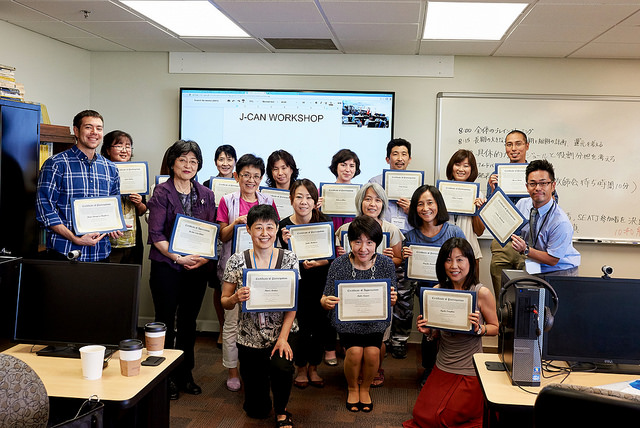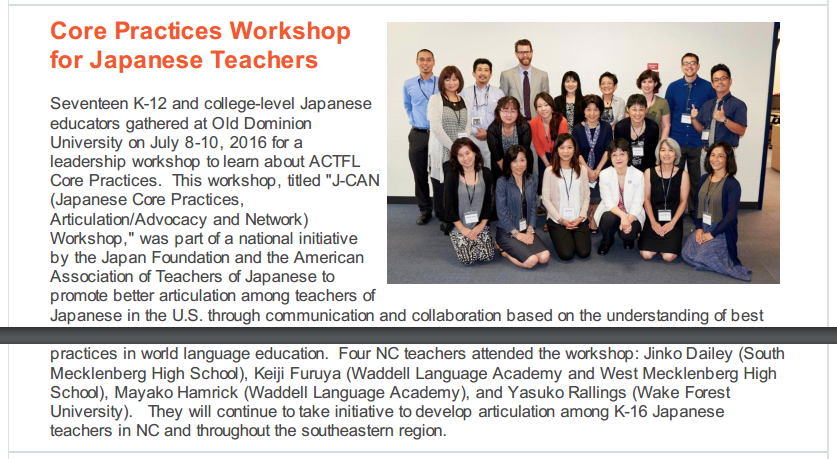J-CANワークショップの報告
日時:2016年7月8日(金)〜10日(日)
講師:河合見恵子先生 (バージニア大学)
齋藤アボット佳子先生 (AATJ会長、カリフォルニア州立大学 モントレーベイ)
Francis Troyan先生 (オハイオ州立大学)
場所:オールドドミニオン大学
講師:河合見恵子先生 (バージニア大学)
齋藤アボット佳子先生 (AATJ会長、カリフォルニア州立大学 モントレーベイ)
Francis Troyan先生 (オハイオ州立大学)
場所:オールドドミニオン大学
7月8日から10日までの2泊3日、バージニア州ノーフォークのオールドドミニオン大学にてワークショップを開催しました。講師は8日と10日は河合先生、9日はオハイオ州立大学のTroyan先生にお願いしました。また、ファシリテーターとしてAATJ会長の齋藤先生にも来ていただきました。参加者はJ-GAPキャラバンワークショップが行われた教師会であるAFTJから5名、MAATJから4名、OATJから2名、SEATJから5名の合計16名。幼稚園から大学までの常勤、非常勤の日本語教師が参加しました。
このワークショップの目的は、
1. 参加者達がお互いのネットワークを広げ、アメリカ外国語教育界の共通言語としてコア・プラクティスを学ぶ。
2. それぞれの地域の課題、目標に取り組みつつ地域レベルの日本語教育の活性化が目指せるようアクションプランを作成する。
3. ワークショップ後もフォローアップにより、ネットワークを保ち、成果が報告し合えるような体制を作る。
というものでした。
このワークショップの目的は、
1. 参加者達がお互いのネットワークを広げ、アメリカ外国語教育界の共通言語としてコア・プラクティスを学ぶ。
2. それぞれの地域の課題、目標に取り組みつつ地域レベルの日本語教育の活性化が目指せるようアクションプランを作成する。
3. ワークショップ後もフォローアップにより、ネットワークを保ち、成果が報告し合えるような体制を作る。
というものでした。
1日目:7月8日(金)
************************************
1日目 (7月8日) のスケジュール
3:00-5:00PM オプションの親睦会、意見交換会
5:30PM 夕食
6:30-9:00PM オリエンテーション
************************************
1日目 (7月8日) のスケジュール
3:00-5:00PM オプションの親睦会、意見交換会
5:30PM 夕食
6:30-9:00PM オリエンテーション
************************************
1日目は早くホテルに到着した参加者が3時から5時まで、会場建物1階ロビーにて自己紹介・親睦会を行いました。お互い初対面の者がほとんどだったので、河合先生の提案で紙に「私は~」という自分に関する文を10個書き出し、ペアになり自己紹介を行いました。ソファに座り、スナックをつまみながら、穏やかな雰囲気の中でお互いを知ることができました。また5時過ぎからは、お弁当を食べながら更に親睦を深めました。
6時半からのオリエンテーションではワークショップの概要説明の後、各参加者が紙に下の4点を書き込み、他の参加者とペアになり、アーティキュレーションに焦点を当てた自己紹介を行いました。パートナーを何度か変えて複数の参加者と会話を進め、自己紹介後、驚いたことなどコメントを1人ずつ述べてもらいました。
1. 氏名
2. 所属学校・教師会名
3. アーティキュレーションがどのくらいできているか(1~10の数値で)
4. 直面している問題や課題・目標
次に各教師会 (MAATJ、SEATJ、AFTJ、OATJ) がパワーポイントやウェブサイトを見せながら、今までの活動内容や成果、課題などを報告しました。
次に参加者は教師会ごとのグループに分かれ、SWOT分析のモデルを用いたアクティビティーを行いました。それぞれのメンバーが教師会の強み (S: Strengths) 、弱み (W: Weaknesses) 、機会 (O: Opportunities)、脅威 (T: Threats) の4つの点ついて感じていることをポストイットに書き込み、壁のイーゼルパッド (画板サイズの巨大なポストイット) に貼り付けました。また、他の教師会のイーゼルパッドも見て回ることで、気づかなかったことや弱みだと思っていたことの利点など様々な気づきがあったようです。
その後、イーゼルパッドの項目をさらに整理、各教師会の今後の課題を明確にし、最終日のまとめの話し合いにつなげる準備を行いました。1日目のまとめとして、それぞれの教師会の強みと克服できることを2、3点ずつGoogleドキュメントに書き込みました。
オリエンテーションの最後に、AATJ会長である齋藤先生からAATJが掲げるJ-CANのイニシアチブについての説明と、これから日本語教師が進んでいくべき道・目標についてのお話しを伺いました。翌日学ぶコアプラクティスなど、アーティキュレーションにおける共通言語の重要さについても説明があり、参加者は更にこのワークショップへの意気込みが高まりました。
6時半からのオリエンテーションではワークショップの概要説明の後、各参加者が紙に下の4点を書き込み、他の参加者とペアになり、アーティキュレーションに焦点を当てた自己紹介を行いました。パートナーを何度か変えて複数の参加者と会話を進め、自己紹介後、驚いたことなどコメントを1人ずつ述べてもらいました。
1. 氏名
2. 所属学校・教師会名
3. アーティキュレーションがどのくらいできているか(1~10の数値で)
4. 直面している問題や課題・目標
次に各教師会 (MAATJ、SEATJ、AFTJ、OATJ) がパワーポイントやウェブサイトを見せながら、今までの活動内容や成果、課題などを報告しました。
次に参加者は教師会ごとのグループに分かれ、SWOT分析のモデルを用いたアクティビティーを行いました。それぞれのメンバーが教師会の強み (S: Strengths) 、弱み (W: Weaknesses) 、機会 (O: Opportunities)、脅威 (T: Threats) の4つの点ついて感じていることをポストイットに書き込み、壁のイーゼルパッド (画板サイズの巨大なポストイット) に貼り付けました。また、他の教師会のイーゼルパッドも見て回ることで、気づかなかったことや弱みだと思っていたことの利点など様々な気づきがあったようです。
その後、イーゼルパッドの項目をさらに整理、各教師会の今後の課題を明確にし、最終日のまとめの話し合いにつなげる準備を行いました。1日目のまとめとして、それぞれの教師会の強みと克服できることを2、3点ずつGoogleドキュメントに書き込みました。
オリエンテーションの最後に、AATJ会長である齋藤先生からAATJが掲げるJ-CANのイニシアチブについての説明と、これから日本語教師が進んでいくべき道・目標についてのお話しを伺いました。翌日学ぶコアプラクティスなど、アーティキュレーションにおける共通言語の重要さについても説明があり、参加者は更にこのワークショップへの意気込みが高まりました。
2日目:7月9日(土)
************************************
2日目 (7月9日) のスケジュール
コア・プラクティスのワークショップ
8:30AM-12:00PM 午前のセッション
12:00PM 昼食
1:00-4:30PM 午後のセッション
6:00-9:00PM 夕食
************************************
2日目 (7月9日) のスケジュール
コア・プラクティスのワークショップ
8:30AM-12:00PM 午前のセッション
12:00PM 昼食
1:00-4:30PM 午後のセッション
6:00-9:00PM 夕食
************************************
2日目はオハイオ州立大学のTroyan先生によるワークショップで、6つあるコアプラクティスの中から下の3つに焦点を当てた内容になっていました。
1. Use the Target Language as the Vehicle and Content of Instruction
- Comprehensible Input
5. Design Lessons and Tasks That Have Functional Goals and Objectives
- Genre in Reading & Writing Instruction
6. Provide Appropriate Feedback in Speech and Writing on Various Learning Tasks
- Co-Constructed Feedback
1. Use the Target Language as the Vehicle and Content of Instruction
- Comprehensible Input
5. Design Lessons and Tasks That Have Functional Goals and Objectives
- Genre in Reading & Writing Instruction
6. Provide Appropriate Feedback in Speech and Writing on Various Learning Tasks
- Co-Constructed Feedback
ワークショップはコアプラクティスの背景にある理論の説明はもちろん、実際の教室活動のビデオ鑑賞および分析、ディスカッションなど様々な角度からコアプラクティスを学び、実践に結びつけられるようするというものでした。参加者たちは積極的に質問や発言をして、理解を深めました。またTroyan先生はIPA (Integrated Performance Assessment) に基づいたルーブリックも紹介してくださり、多くの参加者がIPAに興味を持ったようでした。
ワークショップ終了後は、全員で地元の日本食レストランに行き、さらに親睦を深めました。Troyan先生にはその夜レストランでCertificate of Appreciationをお渡ししました。
ワークショップ終了後は、全員で地元の日本食レストランに行き、さらに親睦を深めました。Troyan先生にはその夜レストランでCertificate of Appreciationをお渡ししました。
3日目:7月10日(日)
************************************
3日目 (7月10日) のスケジュール
8:00AM スケジュール説明/全体のブレインストーミング
8:15AM 長期の大きなゴール、中期と短期計画、地域の教師会への還元を考える
8:30AM 具体的なスケジュールと役割分担を考える
8:45AM フィードバックをもらうための原案の発表
発表+フィードバック
9:30AM アクションプランの練り直し
(オンラインミーティング参加者、SEATJ参加者を決める)
10:00AM 最終発表
10:30AM サーティフィケート授与、写真撮影
10:40AM 終了
************************************
3日目 (7月10日) のスケジュール
8:00AM スケジュール説明/全体のブレインストーミング
8:15AM 長期の大きなゴール、中期と短期計画、地域の教師会への還元を考える
8:30AM 具体的なスケジュールと役割分担を考える
8:45AM フィードバックをもらうための原案の発表
発表+フィードバック
9:30AM アクションプランの練り直し
(オンラインミーティング参加者、SEATJ参加者を決める)
10:00AM 最終発表
10:30AM サーティフィケート授与、写真撮影
10:40AM 終了
************************************
ワークショップ最終日は教師会ごとのグループに分かれ、初日の話し合いを振り返り、2日目で学んだコアプラクティスも取り入れた長期ゴール、中短期ゴールや計画を立ました。またワークショップ後それぞれの地域で参加者がどのように還元できるかも話し合い、発表しました。
この最終日のアクティビティーは、それぞれの教師会がより深く課題について考えよりよいアクションプラン作成ができるよう、話し合い + 原案発表 + フィードバック、そしてもう一度話し合い + 最終発表というステップを踏むようになっていました。各教師会は原案発表の後、齋藤先生やほかの教師会メンバーからのフィードバックを受け、さらに詳しいアクションプランを練ることができたようです。
最後に、参加者には13.5時間のプロフェッショナルデベロップメント時間を証明するCertificate of Participationを授与、齋藤先生と河合先生にはCertificate of Appreciationをお渡しし、記念撮影を行いました。
この最終日のアクティビティーは、それぞれの教師会がより深く課題について考えよりよいアクションプラン作成ができるよう、話し合い + 原案発表 + フィードバック、そしてもう一度話し合い + 最終発表というステップを踏むようになっていました。各教師会は原案発表の後、齋藤先生やほかの教師会メンバーからのフィードバックを受け、さらに詳しいアクションプランを練ることができたようです。
最後に、参加者には13.5時間のプロフェッショナルデベロップメント時間を証明するCertificate of Participationを授与、齋藤先生と河合先生にはCertificate of Appreciationをお渡しし、記念撮影を行いました。
ワークショップ後のアンケート
ワークショップ後は7月12日締め切りのオンライン・アンケートを実施し、13名の参加者から回答を得ることができました。
アンケートの最初のセクションには以下の設問があり、「強く同意する」「同意する」「どちらでもない」「同意しない」「強く同意しない」という5つの選択肢から一つ選べるようになっていました。
いずれの問いに対しても肯定的な回答が多く、否定的な回答はありませんでした。以下のアンケート結果から今回のワークショップで築いたネットワークを活用し、今後も地域の教師会の活動や日本語教育全般に貢献していきたいという参加者の意見、やる気を伺うことができます。
また、記述欄には以下のようなコメントがありました。
また、記述欄には以下のようなコメントがありました。
AATJニュースレター(2016年9月号)の記事
AATJニュースレター(2016年9月号)
AATJニュースレター(2016年9月号)
Report on the J-CAN Workshop
By Yasuo Uotate, President of AFTJ (Association of Florida Teachers of Japanese)
The J-CAN Workshop was held at Old Dominion University in Norfolk, VA, on Friday, July 8, through Sunday, July 10, 2016. This workshop was co-sponsored by the AATJ and the Japan Foundation, Los Angeles (JFLA) as part of AATJ’s J-CAN initiative. The goals of the workshop were to learn about core practices and plan how to implement them in our teaching practices. In addition, we made short term and long-term action plans to advocate for, and to strengthen the networks within and among organizations.
Sixteen K-16 Japanese teachers from four regional Japanese teachers’ associations attended the workshop. The regional associations represented were the Association of Florida Teachers of Japanese (AFTJ), the Mid-Atlantic Association of Teachers of Japanese (MAATJ), the Ohio Association of Teachers of Japanese (OATJ), and the Southeastern Association of Teachers of Japanese (SEATJ).
On Friday, July 8, the participants started with a social gathering and networking with each other at an obento dinner. Then at 6:30pm, the workshop orientation began, lead by Mieko Kawai sensei of the University of Virginia. Each regional association group analyzed their own strengths, weaknesses, the opportunities and challenges they are facing. Based on this information, each association identified their long-term goals as well as mid-term and short-term goals. This was done using a Google Doc to facilitate working collaboratively and sharing the discussion within each group and between all the participants. The first day closed with remarks from Yoshiko Saito-Abbott sensei, the AATJ president.
On Saturday, July 9, Dr. Francis Troyan of The Ohio State University, introduced the Core Practices that have been promoted by ACTFL. Among six core-practices, he focused on three practices (Core Practice 1: use the target language as the vehicle and content of instruction, Core Practice 5: Plan with backward design model, and Core Practice 6: Provide appropriate feedback).
Dr. Troyan discussed comprehensible input, a genre-based approach to reading and writing, and co-constructive feedback with the participants. After the one-day workshop session, the participants continued networking with each other over a Japanese dinner in downtown Norfolk.
On Sunday, July 10, the participants fine-tuned action plans for regional associations based on what they had learned. We used a Google Doc to keep records of our plans. Each association then shared their action plans and received feedback from Saito-Abbott sensei, Kawai sensei, and other participants. At the closing of the workshop, Saito-Abbott sensei, Kawai sensei, and the J-CAN leadership team made remarks, and each participant received a certificate.
This J-CAN workshop provided a wonderful opportunity for the participating K-16 teachers to learn the Core Practices as a common language for articulation, to network and to exchange ideas, and to create action plans to further enhance the Japanese language education in their regions. We greatly appreciate the AATJ and the JFLA’s support for the regional associations’ efforts. The participants are expected to maintain their network, carry out their action plans, and share their newly acquired knowledge and efforts at conferences in the future.
More detail information of our activities can be seen at the following website.
J-CAN Project Website
地域の教師会J-CANプロジェクト
http://jcanproject.weebly.com/
By Yasuo Uotate, President of AFTJ (Association of Florida Teachers of Japanese)
The J-CAN Workshop was held at Old Dominion University in Norfolk, VA, on Friday, July 8, through Sunday, July 10, 2016. This workshop was co-sponsored by the AATJ and the Japan Foundation, Los Angeles (JFLA) as part of AATJ’s J-CAN initiative. The goals of the workshop were to learn about core practices and plan how to implement them in our teaching practices. In addition, we made short term and long-term action plans to advocate for, and to strengthen the networks within and among organizations.
Sixteen K-16 Japanese teachers from four regional Japanese teachers’ associations attended the workshop. The regional associations represented were the Association of Florida Teachers of Japanese (AFTJ), the Mid-Atlantic Association of Teachers of Japanese (MAATJ), the Ohio Association of Teachers of Japanese (OATJ), and the Southeastern Association of Teachers of Japanese (SEATJ).
On Friday, July 8, the participants started with a social gathering and networking with each other at an obento dinner. Then at 6:30pm, the workshop orientation began, lead by Mieko Kawai sensei of the University of Virginia. Each regional association group analyzed their own strengths, weaknesses, the opportunities and challenges they are facing. Based on this information, each association identified their long-term goals as well as mid-term and short-term goals. This was done using a Google Doc to facilitate working collaboratively and sharing the discussion within each group and between all the participants. The first day closed with remarks from Yoshiko Saito-Abbott sensei, the AATJ president.
On Saturday, July 9, Dr. Francis Troyan of The Ohio State University, introduced the Core Practices that have been promoted by ACTFL. Among six core-practices, he focused on three practices (Core Practice 1: use the target language as the vehicle and content of instruction, Core Practice 5: Plan with backward design model, and Core Practice 6: Provide appropriate feedback).
Dr. Troyan discussed comprehensible input, a genre-based approach to reading and writing, and co-constructive feedback with the participants. After the one-day workshop session, the participants continued networking with each other over a Japanese dinner in downtown Norfolk.
On Sunday, July 10, the participants fine-tuned action plans for regional associations based on what they had learned. We used a Google Doc to keep records of our plans. Each association then shared their action plans and received feedback from Saito-Abbott sensei, Kawai sensei, and other participants. At the closing of the workshop, Saito-Abbott sensei, Kawai sensei, and the J-CAN leadership team made remarks, and each participant received a certificate.
This J-CAN workshop provided a wonderful opportunity for the participating K-16 teachers to learn the Core Practices as a common language for articulation, to network and to exchange ideas, and to create action plans to further enhance the Japanese language education in their regions. We greatly appreciate the AATJ and the JFLA’s support for the regional associations’ efforts. The participants are expected to maintain their network, carry out their action plans, and share their newly acquired knowledge and efforts at conferences in the future.
More detail information of our activities can be seen at the following website.
J-CAN Project Website
地域の教師会J-CANプロジェクト
http://jcanproject.weebly.com/
The following reports are the current activities that followed up the initial J-CAN workshop in July.
AFTJ :
- AFTJ will conduct a Bento Contest as part of their advocacy efforts. Nozu sensei and Hagihara sensei (University of South Florida) are currently developing guidelines for the Bento Contest that will be announced in fall, 2016.
- We are grateful to the Consulate-General of Japan in Miami and the Japan Business Association (JBA) of Miami for their support of Japanese language education in the state of Florida. The JBA has conducted a member survey for us to explore the possibilities of creating an internship program and a job fair in South Florida.
MAATJ:
- Tsujioka sensei (George Washington University) successfully recruited a high school teacher to start a new Integrated Performance Assessment (IPA) articulation group.
- The J-CAN Workshop report was sent to the high school administrations, and it was well received
SEATJ:
- Takata sensei (Wake Forest University) and Hamrick sensei (Waddell Language Academy) are creating a list of Japanese clubs and festivals in the region. This list will be used for networking and for making connections. The announcement will be sent out to SEATJ members in September.
AFTJ :
- AFTJ will conduct a Bento Contest as part of their advocacy efforts. Nozu sensei and Hagihara sensei (University of South Florida) are currently developing guidelines for the Bento Contest that will be announced in fall, 2016.
- We are grateful to the Consulate-General of Japan in Miami and the Japan Business Association (JBA) of Miami for their support of Japanese language education in the state of Florida. The JBA has conducted a member survey for us to explore the possibilities of creating an internship program and a job fair in South Florida.
MAATJ:
- Tsujioka sensei (George Washington University) successfully recruited a high school teacher to start a new Integrated Performance Assessment (IPA) articulation group.
- The J-CAN Workshop report was sent to the high school administrations, and it was well received
SEATJ:
- Takata sensei (Wake Forest University) and Hamrick sensei (Waddell Language Academy) are creating a list of Japanese clubs and festivals in the region. This list will be used for networking and for making connections. The announcement will be sent out to SEATJ members in September.
Foreign Language Association of North Carolina (FLANC)ニュースレター(2016年9月号)の記事
FLANCニュースレター(2016年9月号)
FLANCニュースレター(2016年9月号)
Core Practices Workshop for Japanese Teachers
By Yasuko Takata Rallings, President of FLANC
Seventeen K-12 and college-level Japanese educators gathered at Old Dominion University on July 8-10, 2016 for a leadership workshop to learn about ACTFL Core Practices. This workshop, titled "J-CAN (Japanese Core Practices, Articulation/Advocacy and Network) Workshop," was part of a national initiative by the Japan Foundation and the American Association of Teachers of Japanese to promote better articulation among teachers of Japanese in the U.S. through communication and collaboration based on the understanding of best practices in world language education. Four NC teachers attended the workshop: Jinko Dailey (South
Mecklenberg High School), Keiji Furuya (Waddell Language Academy and West Mecklenberg High School), Mayako Hamrick (Waddell Language Academy), and Yasuko Rallings (Wake Forest University). They will continue to take initiative to develop articulation among K-16 Japanese teachers in NC and throughout the southeastern region.
By Yasuko Takata Rallings, President of FLANC
Seventeen K-12 and college-level Japanese educators gathered at Old Dominion University on July 8-10, 2016 for a leadership workshop to learn about ACTFL Core Practices. This workshop, titled "J-CAN (Japanese Core Practices, Articulation/Advocacy and Network) Workshop," was part of a national initiative by the Japan Foundation and the American Association of Teachers of Japanese to promote better articulation among teachers of Japanese in the U.S. through communication and collaboration based on the understanding of best practices in world language education. Four NC teachers attended the workshop: Jinko Dailey (South
Mecklenberg High School), Keiji Furuya (Waddell Language Academy and West Mecklenberg High School), Mayako Hamrick (Waddell Language Academy), and Yasuko Rallings (Wake Forest University). They will continue to take initiative to develop articulation among K-16 Japanese teachers in NC and throughout the southeastern region.
地域の教師会J-CANプロジェクト
